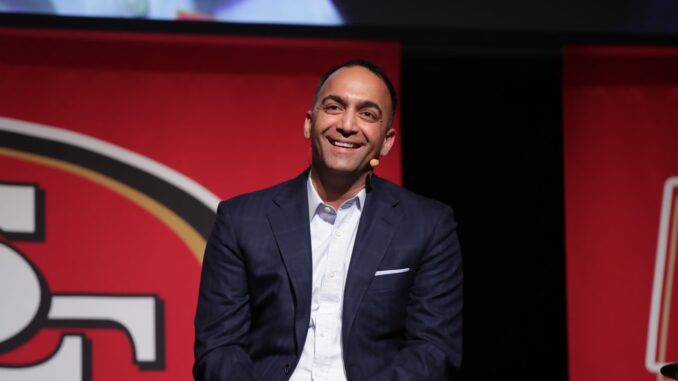
After their investment in the summer, the attention at Elland Road as far as Leeds United’s ownership is concerned has been on Red Bull. However, 49ers Enterprises still makes the most important decisions.
The 49ers, whose president, Paraag Marathe, also serves as Leeds chairman, made their first investment in the West Yorkshire club in 2018, purchasing a 15% stake from then-owner Andrea Radrizzani.
In September of last year, the San Francisco 49ers’ investment arm acquired full control of freshly relegated Leeds in a deal for approximately £170 million.
The 49ers have since restructured their ownership structure, selling an unspecified minority equity stake to the Austrian energy drinks, marketing, and football investment company Red Bull.
For the 49ers,’soccer’ is a relatively new market.
Leeds were the NFL titans’ initial investment in the sport, and they remain so to this day, but there have been recent indications that this may not last long.
Like any investment firm, their long-term goal is to sell the club for a large profit.
Promotion back to the Premier League is critical to that goal, and a few seasons of consolidation would ensure a massive return.
However, the financial benefit to the 49ers’ owners from that transaction would be dwarfed by the amount they might hypothetically collect if they sold the NFL franchise.
And the most recent data from a reputable group of industry specialists demonstrates how significant a windfall the Leeds owners stand to receive one day.
49ers Enterprises sits on a £1.1 billion goldmine in the US.
While many private equity firms are growing interested in football clubs due to the potential worth of their intellectual property, most investors will tell you there are better ways to spend hundreds of millions of pounds.
In terms of finances, the sport remains a meritocracy, with promotion, relegation, and participation in European competitions all having a significant impact on a club’s bottom line.
While many supporters say that the institutions in English and European football are meant to protect the ultra-rich from failure, the sector remains very volatile from an investor’s standpoint.
In comparison to US franchise sports, at least.
The NFL, for example, has relatively set costs, and the league’s cooperative economic model virtually guarantees collective financial success.
It is why private equity groups have pounced on the NFL en masse after the league opted to allow that ownership model in on a minority basis earlier this year.
Latest statistics from industry specialists. Brand Finance demonstrates the NFL’s value as an investment prospect, particularly the San Francisco 49ers.
According to their most recent research, the 49ers’ brand value alone is worth £1.1 billion, a 48 percent increase over the previous year.
According to the report, the reasons for their meteoric rise include increased commercial and matchday revenues, as well as a stronger global profile.
The 49ers have expressed similar ambitions in Leeds, particularly in terms of expanding and upgrading Elland Road to maximise revenue from turnstiles and commercial appeal.
Leeds United owners considering a multi-club model?
According to Red Bull, the multi-club concept provides a variety of financial and brand-building benefits.
For many supporters, the model represents the antithesis of what football is all about: the distinct identities of clubs that have been developed over decades, if not centuries.
That is why so many supporters were sceptical of Red Bull’s front-of-shirt agreement with Leeds, despite the fact that it is thought to have resulted in a Championship record fee.
However, investors usually always do what is best for their own financial interests.
If developing a multi-club model diversifies risk, creates player development pathways, and increases global exposure, that is the strategy they will seek.
With Leeds technical director Gretar Steinsson about to move for a bigger role with the 49ers’ global football organisation, it appears that the Whites may be joining a multi-club operation.
According to reports, this is not an urgent priority for the owners, but it will likely become one in the next months and years.

Leave a Reply